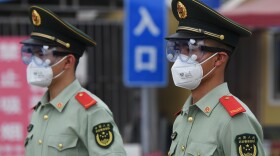
Emily Feng
Emily Feng is NPR's Beijing correspondent.
Feng joined NPR in 2019. She roves around China, through its big cities and small villages, reporting on social trends as well as economic and political news coming out of Beijing. Feng contributes to NPR's newsmagazines, newscasts, podcasts, and digital platforms.
Previously, Feng served as a foreign correspondent for the Financial Times. Based in Beijing, she covered a broad range of topics, including human rights and technology. She also began extensively reporting on the region of Xinjiang during this period, becoming the first foreign reporter to uncover that China was separating Uyghur children from their parents and sending them to state-run orphanages, and discovering that China was introducing forced labor in Xinjiang's detention camps.
Feng's reporting has also let her nerd out over semiconductors and drones, travel to environmental wastelands, and write about girl bands and art. She's filed stories from the bottom of a coal mine; the top of a mosque in Qinghai; and from inside a cave Chairman Mao once lived in.
Her human rights coverage has been shortlisted by the British Journalism Awards in 2018, recognized by the Amnesty Media Awards in February 2019 and won a Human Rights Press merit that May. Her radio coverage of the coronavirus epidemic in China earned her another Human Rights Press Award, was recognized by the National Headliners Award, and won a Gracie Award. She was also named a Livingston Award finalist in 2021.
Feng graduated cum laude from Duke University with a dual B.A. degree from Duke's Sanford School in Asian and Middle Eastern studies and in public policy.
-
At least 15 Chinese workers' rights advocates who were rounded up in recent years have been released from detention, some taking on new identities and jobs, on condition that they abandon activism.
-
The idea is to reduce the risk of spread of viruses through animal-human contact. Bamboo rat breeders are devastated by the loss of income. And critics say the ban has too many loopholes.
-
Meet some of the people in China who lived through the start of the coronavirus pandemic. They have not forgotten the weeks of isolation, fear and heartbreak.
-
Officials have discovered 79 symptomatic cases of the coronavirus linked to the Xinfadi food market, prompting a return to partial lockdown measures and fears of a second wave of infections.
-
Measures to mitigate the coronavirus pandemic have devastated China's economy, shutting factories and urban jobs that millions of migrant workers depend upon. Many now seek jobs in their villages.
-
Thousands of people gathered in Hong Kong's Victoria Park to commemorate the victims of the 1989 massacre in Beijing by China's military — even though this year's rallies were officially canceled.
-
Hong Kong is supposed to be a semiautonomous enclave of China, "one country, two systems." But China is moving to impose a sweeping national security law on the city, which critics say is illegal.
-
The Trump administration issued tough export rules this month, which analysts say could spell a death knell for the company's worldwide mobile network ambitions.
-
The renewed push from China to pass a national security law will almost certainly set off more protests against Beijing's rule in Hong Kong, which is semi-autonomous.
-
Both countries eased some of their intensive rules after new cases slowed to a trickle. But clusters have cropped up again this month, and authorities are ramping up testing to try to curb the spread.











